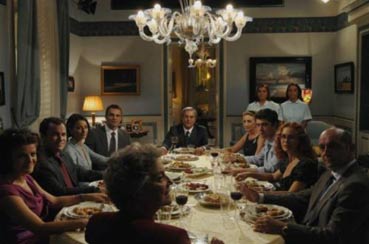|
Stripping Luca Guadagnino's I Am Love of its austerity and hooking it up to an intravenous injection of the deft and gleeful camp that informed Mike Nichols' The Birdcage, the resultant manner in which one family's secrets come out of the closet would probably give you something like Turkish born, Italian adopted director Ferzan Ozpetek's third feature Loose Cannons. Now that I'm done playing at the 'X + Y =' equations of poster pull-quote critics, I can tell you that the chief reason to choose subtitles over the panto during the festive season, other than to avoid kiddie oriented drivel, is for the two hour round trip escape from the artic blast currently bringing more snow to our less idyllic shores. Watching this is much like buying a plane ticket for warmer climates and just as riotous as the Easy Jet flight over there. Director of photography Maurizio Calvesi (who also shot Philip Haas' hard to find and underseen Up at the Villa) shoots the southern city of Lecce in welcome holiday brochure format, an appropriate choice that's right in keeping with a family drama where appearances are everything.
The Cantone clan are cinema's latest in a long line of dysfunctional broods gathering at the family home for special occasions, only to fray already precious relationships to breaking point when bombshells are dropped at the dinner table, be they announcements of future intentions or unearthing secrets from the past. It's safe to say, this film covers both, in a set-up American indie cinema has used with increasingly diminishing returns since the Sundance boom of the nineties, more often than not as an excuse to put a load of oddballs in the same room (cinema would have you believe you won't find a more miserable event on the American calendar than thanksgiving). The occasion here is patriarch Vincenzo (Ennio Fantastichini), passing over the reigns of his pasta manufacturers to his two sons whilst embarking on a merger with an associate, which will bring two local families together and save their dwindling fortune. The night before this is formally announced, younger brother Tommaso (Riccardo Scamarcio), home from studying in Rome, confesses to his brother Antonio (Alessandro Preziosi), already an assistant manager at the factory, that he is studying literature, not business, that he wants to write a novel and is gay. Knowing how his father will react, Tommaso plans to come out in order to get kicked out, so that he can escape the burden of filial expectation and pursue his literary aspirations.

With the support of his brother, the stage is set for Tommaso to tell la famiglia and their soon to be business partners the news over dinner, and for the audience to spend the next two hours watching the Cantones fall apart and come back together as they deal with the fallout of this shocking declaration... only nothing of the sort is allowed to transpire. Ozpetek and co-writer Ivan Cotroneo thrillingly break convention with a devilish narrative twist that will have viewer's mouths agape, the kind seismic enough that when Vincenzo has a heart attack right there at the table, you'd fall over too if you weren't already sitting down. Just as Tommaso is awkwardly tip-toeing around the big reveal, his brother interrupts him and steals his thunder to tell all those assembled that he is gay also and in love with one of the factory workers; tragic-comic bathos par excellence that wrung choked disbelieving laughter from everyone at my screening and undermined the self-serious tone I'd expected the film to take. A disgraced Vincenzo then demands his favourite son and heir leave the house and collapses immediately thereafter. Believing any further revelations might be enough to kill his already fragile father and with his family now teetering dangerously on the brink of self-implosion as they scramble to preserve their public image (never mind the private one of alcoholism, diabetes and homophobia), Tommaso bottles the truth, choosing to stay behind and carry on as his father intended.
Stories which feature introverted lead characters struggling to break free of their families' suffocating grip are usually the kind of miserablist, sorrow-wallowing tales that distributors all too predictably roll out during awards season. Ozpetek has unfairly been labeled by the Italian press as being just as predictable in the way his family drama piles on geographical cliché. I'm not really seeing it beyond the fact that Italian families tend to be rather large and gather daily around the table to consume vast amounts of pasta, so dinner table revelations obviously work well for this kind of thing. I've certainly never seen a situation in which two brothers race against each other to out themselves during an evening meal, a set-up that does much to make you forgive otherwise familiar staging. I was far more wary of the cliché way this might develop along expected lines of queer cinema given the social milieu; the director tackling an altogether different type national stereotype whilst simultaneously engaging in a bit of Oscar bating. I was fully expecting to see a neon light parallel drawn between the homophobic family and the Vatican's continuous denouncement of same sex marriage and their rigid re-enforcement of conservative Catholic values on issues of family and sexual morality and thus, turning Loose Cannons into exactly that kind of 'issue' film about the struggle for gay liberation that Ozpetek clearly isn't interested in making. Pleasingly, he sidesteps political sentimentality altogether by refusing to deify his protagonist's secret strife and taking a different tact that saves us from having to watch Tommaso clashing in route order with each and every family member atop his proverbial soapbox. Where it would have been all too easy to champion alternative families under conservative rule, Tommaso's story and that of his gay friends who later come to visit him at the height of his conflict of self-interest, is actually one of homosexuals aligning themselves in the minefield of straight society. Instead of the vilified caricature pertaining to much of queer cinema, where the construct of family is seen as innately oppressive, Ozpetek posits that even under domestic dictatorship, blood runs thicker than duty.

Undoubtedly there's a lot of collateral damage before any such resolution, Antonio telling us shortly before he is exiled that the cost of happiness in this family weighs too heavily – not just on the gay members but the females as well – a condition that is suggested to reach far beyond the Cantone household, unsurprisingly given the southern setting where conservative values are most prevalent. As the would-be love interest, sexy enough to make even the most resolved gay man go straight, factory co-manager Alba (a sizzlingly dressed Nicole Grimaudo), daughter of Vincenzo's business associate, is very much the business savvy equal of the two brothers, molded very much in her father's image. Following her lead, Tomasso's sudden snap to conformity is at times infuriatingly passive, that compulsion is convincingly illustrated by a flashback to grandmother Olma's wedding day that shows how the repression of towing the family line stretches across the generations and how instincts of blood can be almost impossibly hard to sever. Tomasso's only concession to resistance in a place he doesn't belong is to audibly grunt his displeasure as he packs pasta, a course signifier a little too close for comfort to a commonly used homophobic slur, the kind that might be slung just as carelessly around the Cantone dinner table. Far from a scathing attack on the establishment, these provincial characters dream of a time where they are be accepted by it. A cleverly conceived dream sequence that stages a seamless visual hand-off between past and present at the film's conclusion, brings generations together in silent celebration and this'll either read as cloying fantasy or a hopeful one depending on your degree of cynicism.
Where this kind of material would ordinarily put its emotionally fraught cards on the table given a time of year where you can only usually choose between overly-peppy kids' movies or the suicidally grim Oscar contender, Loose Cannons is never too heavy to digest, given that its tone is pitched somewhere between a comedy of errors and irreverent farce – sometimes a little too irreverent for its own good – the film's score by Pasquale Catalano puts exclamation points on comedic beats with a cartoonish sounding rattle, the musical equivalent of an incredulous raised eyebrow in close-up, but for the most part, Ozpetek walks that indecipherably fine line admirably, putting as much emphasis on arrabiata, sharp suits, fast cars and toned torsos as he does angst and inner soul-searching.
For reasons of keeping the tone consistent, acts of rebellion only subvert for comedic effect, but never threaten to overthrow the establishment the Cantones represent. Tomasso's visiting gay friends unequivocally fail at keeping a lid on their homosexuality with hilarious results and it's only due to the family's aloof, ignorance they are not discovered. You laugh at Vincenzo even when he's crying, such is the measure of his misplaced grief. Through tears he confesses to Tomasso his disappointment at Antonio having crafted a very effeminate looking leaf basket when he was a child, something that only makes sense to him now, not realizing it was Tomasso, not Antonio who made the basket. Vincenzo's constant misreading of his son's friends is indeed a rich source of comedy; as he is reveling in spreading news of the arrival of these 'manly men' at his house and warning the townspeople to lock up their wives and daughters, this four-man firework explosion of camp are disco dancing in Speedos like a Busby Berkeley chorus. So enamored are the wives by these new arrivals that they don't notice how they openly flirt with their husbands. This register of knife-edge discord and hanging on every moment for them to be found out offers many a laugh-out-loud moment: one of the friends squealing in delight at recognizing the designer of a family member's dress and then having to quickly temper his excitement, remarking that his girlfriend has the exact same dress is one such standout.
At times the film does get a little preoccupied with maintaining a steady laugh quota, sometimes to the detriment of Tomasso's story arc: he's a writer who we never see write, someone who is never given a moment to articulate what draws him to the art form. His final announcement to his parents of wanting to go off and write is supposed to send as big a shockwave as the revelation of his sexuality, but without understanding this urge or feeling his passion, the scene falls flat, an anomalous non sequitur in a film that otherwise works hard to provoke every reaction it wants to get out of it's audience. For it's efforts it's a richly rewarding experience that always remains emotionally authentic even when it strays into televisual histrionics, which is acceptable given a title indicative of a film where character's emotions turn on a dime so readily.
|